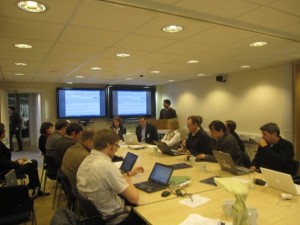[Cross-posted on Berkman’s Internet and Democracy blog]
Two events have recently shaken Italian cyberspace: the launch of the Italian version of Facebook and the comments of Italy’s Prime Minister Silvio Berlusconi after the election of President-elect Barack Obama. I believe that after these two events Italian social and political life may never be the same again.
I do not think I am exaggerating trends here, although empirical data for now is scarce. Being myself one of the early adopters of Facebook, at the start I only had a few Italian Facebook friends in my mainly Anglo-Saxon circle – most of my Italian friends were offline, and those already on Facebook like myself were mainly living abroad or they were back in Italy after having spent some time abroad. This was hardly surprising, given that Italy still has one of the lowest rates of Internet use in Europe (35.6% according to a 2006 Istat report). But in the past couple of months Facebook has been literally invaded by Italians, quickly helping Italy reach first place for the greatest (and fastest) exponential growth in adoption of Facebook by a country. Italians seem to have a natural affinity with Facebook – they are not only joining in huge numbers (Facebook is now the fifth most popular site in Italy) but they seem to have seamlessly integrated this technology in their everyday life: Facebook is fast becoming the new “telefonino”.
My surprise, however, did not stop here. With the election of President-elect Barack Obama and the subsequent unfortunate comments made by the Italian Prime Minister Silvio Berlusconi a huge wave of protest has swept Italian cyberspace. The New York Times article, which gave the news, received 2000 comments in a couple of days. Groups to protest the Prime Minister’s words have been literally mushrooming on Facebook overnight – reaching thousands of members in a matter of days (one only needs to enter ‘Berlusconi’ in the search box to check them out). The group ‘I bet I can find 1,000,000 people who dislike Silvio Berlusconi’ has reached 70,000 members, with an increase of almost 10,000 members in less than one week subsequent to the diplomatic incident. And the protest is quickly moving beyond Facebook’s boundaries. Notspeakinginmyname.com is a new website where people can upload a photo of themselves holding a banner stating that the Italian prime minister is not speaking in their names. Clearly young Italians’ discontent (as it is young people who are mainly inhabiting Facebook) and frustration with the current political situation and with their political representatives is finding in the Web a channel to let youth voice be heard.
Italians have just discovered the power of the Internet – which will make for interesting developments for the Italian media ecology and especially for political participation, in a country where the Web is still viewed with suspicion by most political candidates, with a few exceptions. This shift in social habits is only starting and whether it will gain momentum will depend on whether it will reach a tipping point (or a critical mass) – although some of the protest groups on Facebook seem to have already gotten there.


